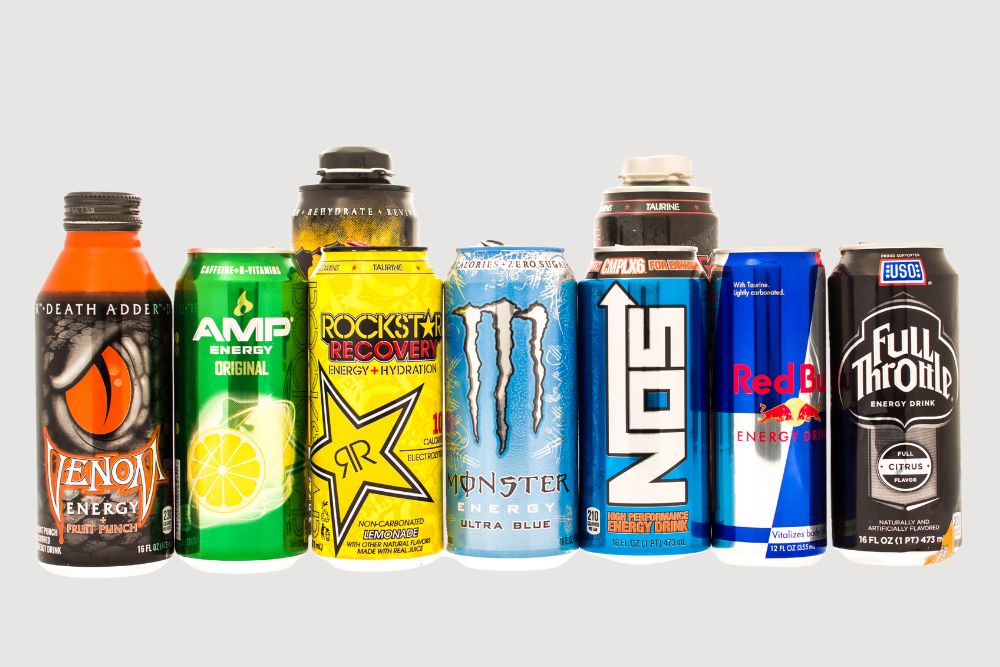Energy drinks are big business worldwide. The global energy drinks market is projected to reach US$125.11 billion by 2030. People of all ages are consuming these drinks, drawn in by claims of increased energy, better focus, weight loss, and other reported health benefits from ingredients like taurine and vitamin B12.
An energy drink is a beverage specifically formulated to boost energy, mental alertness, and physical performance, usually through a combination of stimulants and other ingredients, including sugar and caffeine.
But what are energy drinks really doing to our bodies? Might they be causing more harm than good?
History of the Energy Drink
The first energy drink dates back to 1962, when the Japanese company Taisho created a vitamin- and caffeine-infused beverage called Lipovitan D, which was marketed as a medicinal elixir to improve low-energy levels and fatigue. In the 1980s, Austrian businessman Dietrich Mateschitz discovered the energy-boost drink Krating Daeng on a trip to Thailand and, seeing its popularity, accessibility because of price point, and how it helped his own jet lag symptoms, partnered with a Thai company to create a carbonated drink infused with caffeine and taurine that became the Red Bull we are familiar with today. In 1997 he brought his creation to the United States, igniting an explosion of the energy drink market that is now more ubiquitous than ever.
Health Risks of Energy Drinks
While energy drinks are marketed as safe and even beneficial to health because of the nutrients they contain, energy drinks can be quite harmful to your health.
Some ingredients found in mainstream energy drinks include:
- Caffeine
- Sugar
- Vitamin B6 and B12
- Amino acids, including taurine
- Guarana
- Ginseng
- Glucuronolactone
- Yohimbe
- L-carnitine
- Bitter orange
- St. John’s wort
- Ginkgo
- Yerba Mate
Consider the caffeine content. While it varies from product to product, a single energy drink may contain 200–300 mg which is close to the FDA’s general guidance of 400 mg/day for healthy adults. Acute toxic effects are reported around 1,200 mg consumed rapidly.
Consuming too much caffeine can lead to symptoms ranging from nervousness to tachycardia (abnormally rapid heart rate). Many energy drinks also contain stimulants such as guarana and ginseng that may further increase your risk of cardiovascular and nervous system issues. Taurine is often used to amplify the stimulant effect of caffeine.
The caffeine and other ingredients in energy drinks may be particularly dangerous for children and teens and may even damage their developing brains. The American Academy of Pediatrics advises that youth should avoid energy drinks entirely.
Energy drinks also tend to contain excessive amounts of sugar. A typical 16 oz. energy drink contains 50–62 grams of added sugar. This means a single can exceeds the recommended amount of added sugar (no more than 36 grams for men and 25 grams for women but ideally much less) a person should consume in a day. Sugar-free versions use non-sugar sweeteners which have long term health risks.
Energy drinks also add a number of nutrients like B vitamins. While not bad in and of themselves, they are added in excessive amounts, and these nutrients can be consumed naturally in food or a supplement if needed in a more controlled manner without all the negative ingredients like sugar.
Energy drinks are acidic (due to ingredients like citric acid) and can be linked to enamel erosion with frequent exposure.
Side effects of excessive energy drink consumption include:
- Anxiety/nervousness/jittery feeling
- Rapid heartbeat and palpitations
- Insomnia and other sleep issues
- Upset stomach, diarrhea, and other types of digestive distress
- Loss of appetite
- Dehydration
- Chest pains
- Dizziness
- Weight gain
- Tooth and gum problems
A 2023 review in the journal Nutrients comprised of nearly 100 studies involving the health effects of energy drinks found “a significant prevalence of adverse effects, particularly on the cardiovascular and neurovegetative systems.”
Wiseman Health Take-Home Points
1. Don’t consume energy drinks on a regular basis. They really need to be put in the soda and sweets category – meaning you can consume occasionally, but habitual, consistent consumption is a poor long term health choice.
2. Focus on drinking purified water daily for hydration. One of the best ways to stay ahead of hydration and avoid dehydration is to begin your morning by drinking 16 oz. of pure water. As well, filling up a large drinking container with water, one that you can carry with you all day and can hold your total daily water consumption (usually 3–4 liters for men and 2–3 liters for women), is an excellent way to stay hydrated, boost energy and cognitive function, and improve mood and sleep, among a host of other positive overall health effects for your body.
3. Focus on natural and sustainable lifestyle approaches for optimal daily energy. If you are using energy drinks as a stimulant, see what lifestyle changes you can change to improve your baseline energy level such as improving sleep, getting daily or weekly sunlight, eating a whole food diet, getting exposure to Nature, decreasing stress, and improving exercise.
4. If you enjoy daily caffeine, stick to naturally caffeinated beverages like unsweetened green tea, black tea, and coffee. Consume these beverages in moderation, and make sure you’re always drinking enough water to stay hydrated.
5. If you’re looking for a safer way to replace electrolytes and other nutrients lost through sweat, consider coconut water or natural spring water, which is Nature’s electrolyte water. Pure vegetable and fruit juices made without any added sugar, preservatives, or other ingredients are another healthier source of energizing vitamins and minerals.
6. There are a number of more natural “energy drinks” on the market, like natural yerba mate, mushroom coffee, and ashwagandha tea.
7. No matter how they are marketed, most popular energy drinks are not health drinks and though they might provide some short-term energy in the form of stimulation, they are not a healthy or sustainable approach to long term energy and wellness.
Editor’s Note: This article was originally published on September 19, 2025.
U.S. Energy Drinks Market-Industry Analysis, Market Size, Share, Trends, Growth and Forecast 2024-2030. Accessed May 29, 2025 https://www.industryarc.com/Research/U.S.-Energy-Drinks-Market-Research-508442
Who Made That Energy Drink? (2013, December 6). nytimes.com Retrieved June 4, 2025 from https://www.nytimes.com/2013/12/08/magazine/who-made-that-energy-drink.html?smid=nytcore-ios-share&referringSource=articleShare
Costantino A, Maiese A, Lazzari J, et al. The Dark Side of Energy Drinks: A Comprehensive Review of Their Impact on the Human Body. Nutrients. 2023;15(18):3922. Published 2023 Sep 9. doi:10.3390/nu15183922
Curran CP, Marczinski CA. Taurine, caffeine, and energy drinks: Reviewing the risks to the adolescent brain. Birth Defects Res. 2017;109(20):1640-1648. doi:10.1002/bdr2.1177
Energy Drinks and Kids: What You Need to Know hopkinsmedicine.org Retrieved Jun 4, 2025 from https://www.hopkinsmedicine.org/health/wellness-and-prevention/energy-drinks-and-kids

